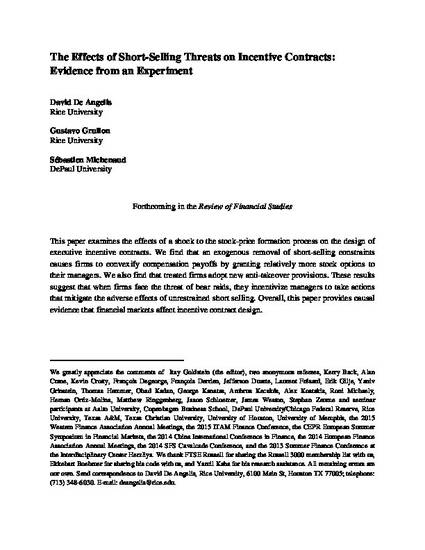
Article
The Effects of Short-Selling Threats on Incentive Contracts: Evidence from an Experiment
Review of Financial Studies
(2017)
Abstract
his paper examines the effects of a shock to the stock-price formation process on the design of executive incentive contracts. We find that an exogenous removal of short-selling constraints causes firms to convexify compensation payoffs by granting relatively more stock options to their managers. We also find that treated firms adopt new antitakeover provisions. These results suggest that when firms face the threat of bear raids, they incentivize managers to take actions that mitigate the adverse effects of unrestrained short selling. Overall, this paper provides causal evidence that financial markets affect incentive contract design.
Publication Date
May 1, 2017
DOI
10.2139/ssrn.2238236
Publisher Statement
David De Angelis, Gustavo Grullon, Sébastien Michenaud, The Effects of Short-Selling Threats on Incentive Contracts: Evidence from an Experiment, The Review of Financial Studies, Volume 30, Issue 5, May 2017, Pages 1627–1659, https://doi.org/10.1093/rfs/hhw105
Citation Information
David De Angelis, Gustavo Grullon and Sebastien Michenaud. "The Effects of Short-Selling Threats on Incentive Contracts: Evidence from an Experiment" Review of Financial Studies Vol. 30 Iss. 5 (2017) p. 1627 - 1659 ISSN: 0893-9454 Available at: http://works.bepress.com/sbastien-michenaud/5/
